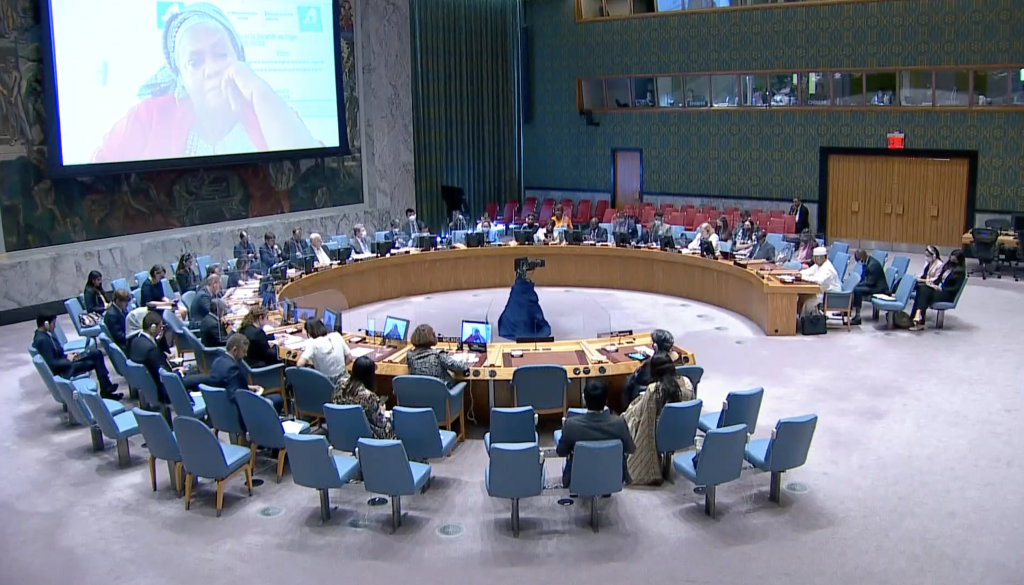Statement by Deputy Permanent Representative Anna Evstigneeva at UNSC briefing on the activities of the UN Office for West Africa and the Sahel
Mr.President,
At the outset, let me congratulate you and the delegation of Brazil on assuming UNSC Presidency in July. I am convinced that it will be successful and productive. We also thank Albania for its Presidency in June.
We thank SRSG for West Africa and the Sahel Mahamat Annadif, as well as Chair of the Peacebuilding Commission Rabab Fatima, and our CSO briefer for their statements.
We share the concerns that were raised here today regarding the situation in many countries of West Africa and particularly the Sahel. The region encounters immense terrorist threats, conflicts continue, organized crime and drug trafficking flourish. In the first 6 months of 2022, more people have died at the hands of militants than in the entire previous year. We express our support for all those who have embarked on a challenging fight against terrorism in the region.
The humanitarian situation remains very complicated. The number of IDPs and people in need of food assistance has increased sharply. Many schools and medical institutions are closed. All this makes it necessary for the states of the region, particularly the Sahel, to double efforts in order to recover effective state governance and control. In this regard, we wish every success to regional states as they carry out Joint Strategic Assessment of Security and Governance in the Sahel and implement the Accra Initiative.
We welcome arrangements made between Mali and ECOWAS on 3 July at a summit in Accra. The lifting of sanctions off Bamako and endorsement of election terms is a positive development for the entire region. We do hope that this step will help build confidence, normalize the relations and unlock ways towards combating the accrescent challenges. Progress with resolution of disputes regarding Burkina Faso and Guinea will also contribute to this normalization.
At the same time, we have to state that withdrawals from Mali of counter-terrorism operation Barkhane and of European force Takuba, neither of which was coordinated with Bamako, negatively affects the security situation, at least in a short-term prospect. Amidst those circumstances, Russia proceeds from its bilateral agreements with Mali to help this country combat terrorism. Positive results can already be seen. Thereby we reject any unsubstantiated allegations that try to besmirch Russian assistance to Mali and other countries of the continent. Neither Mali nor other states of the region have ever expressed any reproach to us. At the same time, we are deeply concerned that some Western states believe they can speak on behalf of states and nations of the region, including Mali (as the US representative did today). They assume they know what people living there want. Allegedly, they want what Washington wants. And this is very alarming. Perchance, the United States also knew what people in Iraq, Afghanistan, Libya wanted the most? Methinks they could not wish same as Washington, not even in their scariest nightmare – neither Libyans nor the people of the Sahel who still suffer from direct consequences of Libya’s 2011 invasion.
Mr.President,
We see that external interference keeps provoking disputes in the region, e.g. in such an essential mechanism as G5 Sahel Joint Force, which Mali was basically made to withdraw from. What was ignored thereby was a simple and commonly recognized fact that terrorism in that region cannot be defeated without Mali’s involvement. So we are convinced that the main role in maintaining peace and security in the Sahara-Sahel region must be played by the people of the Sahel in the first place. We believe states of the region should stick to an independent policy in order to resolve those issues in accordance with the principle "African solutions to African problems”.
Back to the topic of UNOWAS. The Office is to pursue large-scale and rather challenging tasks – promote settlement of regional crises, take part in political mediation, assist in strengthening state institutions and implementing the UN Integrated Strategy for the Sahel, act as coordinator for other UN presences on the ground. Effectiveness of UNOWAS directly depends on whether it interacts meaningfully with such regional organizations as the African Union, ECOWAS, Lake Chad Basin Commission. We support the conclusions of the Peace and Security Council of the African Union made after a meeting on 1 July regarding the need to boost interaction and coordination among all mechanisms that are active in the region in order to promote resolution of Sahel’s problems.
In conclusion, we remind our colleagues that after the United Nations Integrated Peacebuilding Office in Guinea-Bissau (UNIOGBIS) was closed in 2020, UNOWAS assumed responsibility for monitoring developments in this country. In these circumstances, we believe that preserving UNSC sanctions against Guinea-Bissau under Chapter VII of the UN Charter, that are only envisaged for situations characterized by threats to international peace and security, is absurd. We call to start dismantling the sanctions gradually.
Availing of this opportunity, we express our appreciation to SRSG Annadif for his commitment and relevant efforts aimed at helping the states of West Africa, Sahel, and Lake Chad Basin overcome their current predicaments.
Thank you.
